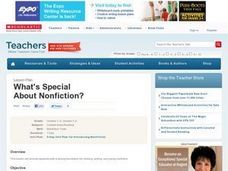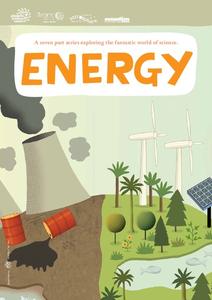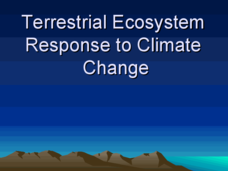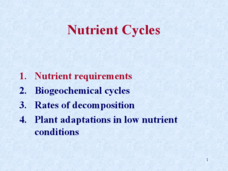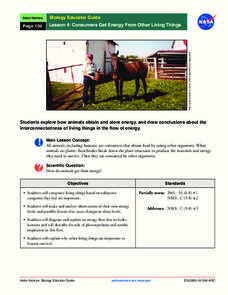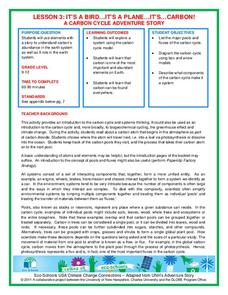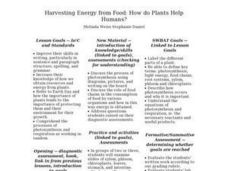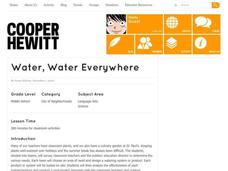Curated OER
Protists - The Protozoans
Five pages provide thorough coverage of three protozoans: euglena, amoebae, and paramecia. For each, junior biologists read factual text, label the organism, and write answers to several questions. This neatly organized assignment is...
Forest Foundation
The Nature of Trees
Young botanists examine the different parts of tress and then draw parallels between the functions of these parts and the function of parts of the human body.
Curated OER
What's Special About Nonfiction?
Students examine the difference between nonfiction and fictional writing. They identify the characteristics of nonfiction literature and examine how a nonfiction textbook organizes information.
Curated OER
How Does Your Garden Grow?
Young gardners read and listen to books about seeds, plants, and the growing process. They plant seeds in plastic cups to observe the process of root-growing and plant formation. The whole class walks through a field to collect seeds...
Curated OER
Energy
In this science activity, students learn about renewable, non-renewable and sustainable energy and examine alternative fuel sources by studying the information on these 8 pages. Students complete 20 questions about energy. These pages...
Curated OER
Build Your Own Cell
For this building your own cell worksheet, students identify cell vocabulary and facts, and create posters of a labeled plant cell and an animal cell. In this fill-n-the-blank and posters worksheet, students provide twenty-three answers.
Curated OER
Terrestrial Ecosystem Response to Climate Change
An extensive investigation of the Earth's climate changes awaits your environmental science classes. This top-notch presentation begins by looking at the history of Earth's climate and then predicts the impact on each major terrestrial...
Curated OER
Nutrient Cycling
AP environmental science or college-level ecology classes will glean a tremendous amount of information on nutrient cycles from this detailed PowerPoint. It covers nutrient requirements, biogeochemcial cycles, decomposition rates, and...
Curated OER
Living Systems Part III
Here is a fantastic, informative, interactive presentation on plant and animal cells. The PowerPoint is produced by an elementary school teacher who has a doctorate in science, and it shows! This would be a splendid presentation to use...
Curated OER
Chalkboard Challenge
Here's a terrific Jeopardy-style game that's designed for 3rd and 4th grade students of science. The topics include living things, animals, plants, matter, and "hodge-podge." The questions are all age appropriate, and there is an...
Perkins School for the Blind
Building an Organic Molecule
Glucose is a simple sugar and a molecule that can be illustrated through modeling. Scientific investigators with visual impairments use hands-on models to reconstruct the process of bonding molecules. The tools used in this activity are...
NASA
Consumers Get Energy From Other Living Things
How do plants and animals get their food? Learn about where energy comes from, how animals store energy, and aerobic respiration, in a instructional activity that allows scholars to diagram energy flows.
Virginia Department of Education
Cell Parts
What do a bird, an egg, a rabbit, and a toad all have in common? This fun-filled resource explains the similarities and differences between cells and how all cells are similar, yet all are different. Learners begin by depicting a...
National Wildlife Federation
It's A Bird...It's A Plane...It's...CARBON!
An interesting lesson plan takes pupils on a trip through the carbon cycle. A reading passage allows scholars to take notes and make choices about what happens to the carbon on its journey. This third lesson plan in a series of 21...
Curated OER
Harvesting Energy from Food: How do Plants Help Humans?
Beginning botanists view slides of plant vascular tissue. They watch Magic School Bus Gets Planted, which you can find online, and then write a summary of what they have learned about plants. This instructional activity could be used...
Curated OER
Water, Water Everywhere
Students devise a system for watering classroom plants during school year and summer breaks. In this watering system instructional activity, students work in teams to investigate water needs of plants and develop systems that will keep...
California Academy of Science
Carbon Cycle Role Play
Anytime you make concepts clear with role playing or hands-on experience, it's a win for the whole class. Ping-Pong balls are used to represent carbon in a carbon cycle role-play activity. In small groups, children first discuss what...
Curated OER
Circle of Life
Here is a well-designed science lesson that shows learners that everything that organisms do in ecosystems, including running, breathing, burrowing, growing, requires energy. After a thorough discussion of their own eating and drinking...
Curated OER
Sinking Races
Young scholars build plankton models and compete to see which sinks most slowly. They write, or orally present ,the adaptations they incorporated to slow the sinking rate of their organisms. Race results can be grounds for some prizes!
Curated OER
How Diverse is That?
Compare various types of biological diversity in a coral reef and calculate a numeric indicator that describes the diversity found in coral communities. Your class can work in groups to look at the abundance and distribution data of...
Curated OER
Save a Reef!
Design a public information campaign to improve understanding of the coral reef crisis. Read about and discuss the biology and threats to the coral reef. The class creates a public information program about the problems facing the coral...
Curated OER
Transport in Plants
Quite a detailed and advanced look at the transport mechanisms of a plant. The absorption and control of sugar and water concentration are explained and will help an understanding of homeostasis concepts and organ specialization.
Curated OER
The Structure and Function of Cells: Making Biology Fun
Investigate life below a microscope, and cells and discover the differences between plant and animal cells.
Other popular searches
- Photosynthesis Worksheets
- Photosynthesis Crossword
- Photosynthesis & Respiration
- Photosynthesis Lab
- Photosynthesis Role Play
- Biology Lab Photosynthesis
- Photosynthesis in Plants
- Science Photosynthesis
- Photosynthesis / Respiration
- Plant Biology Photosynthesis
- Photosynthesis and Respiration
- Unit Photosynthesis




